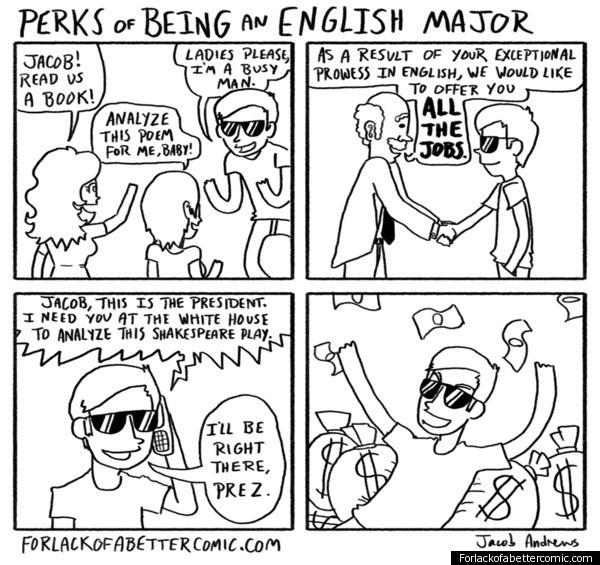Now, on to the learning outcomes:
1. Gain Shakespeare Literacy
Breadth:
I definitely feel that I have achieved this part of the outcome. Before this class, I had only ever read Romeo and Juliet and Much Ado About Nothing. But that was back in high school. That was way too long ago. Now I have added to that list with The Tempest, Hamlet, Love's Labour's Lost, The Merchant of Venice, A Midsummer Night's Dream, Henry V, and King Lear.
Depth:
I feel that I really understand A Midsummer Night's Dream a whole lot more now. I remember doing Hamlet and breaking into groups to further delve into different monologues (which was really fun). While I didn't do exactly that for this play, some of Emily's research really led me to look at it in a different way. As this play was really closely tied into our final project, I learned a lot more about the symbolism of it all and how certain phrases or writing methods could be compared to other plays. I kind of had to in order to get my ideas down well for the Shakespeare Discussion Panel that we did, as well as how we came up with the name Ortegia for Star-Crossed. Yet again, I didn't post all we went through for that, but we wanted it to tie into Artemis (Goddess of the Moon and the Woods/Hunt) as she fit in so well with A Midsummer Night's Dream. It took so long to find that!!!
Performance:
Beyond Wishbone, I don't really know if I had ever seen even a basic production of Shakespeare. I don't know how I managed that. I really liked it though, seeing the characters come to life. The plays definitely have a better feel in that way. I still occasionally found it difficult to follow all the dialogue, which is why I was so glad I had already read and analyzed each play before watching. At least I had a general idea! Of course, it also led to me being more judgmental, like how a fan of a book is disappointed in the movie made based on the book. I also found that if I didn't like a play as much as others, I didn't like the play as much either.
Legacy:
Well, I definitely tried to understand it well. Hmmm, I am not sure if I can say that I REALLY know a lot about all the history--although I definitely did get some of that, like words and phrases Shakespeare came up with or popularized--as I more-so focused the actual text. I definitely saw how it was in popular culture though. If you remember my blog on The Lion King 2, you'll see the Merchant of Venice quote in there. There more I know about Shakespeare, the more I see references to his works in things around me. I always feel kind of happy when I see that.
2. Analyze Shakespeare Critically
Textual Analysis:
Hmmm. Although we did do a good bit of this in class, I don't feel like I dove into this as much as others. While I did have some posts about Hamlet's soliloquy and I remember talking about the rhyming in A Midsummer Night's Dream, I feel like I generally tended to focus more on how the plot of the play could be applied to life. Or math. Which is basically the same thing. :)
Contextual Analysis:
I applied the plot/words, etc. a lot to modern-day living, I feel. That's something I felt I did pretty well with. I don't know--I just seem to naturally try to always apply the plot to life around me and see it, so I always seemed to gravitate more to that than anything else.
Application of Literary Theories:
Well, I didn't do a whole lot with Literary theories. At least, I didn't do so specifically.
Analysis of digital mediations:
You know, I don't think I ever sat down and wrote about anything that I watched, besides Lion King 2--which doesn't count. And it's probably too late to do so now. Oops! But it is always interesting to see the different takes and styles that are pursued in a movie in comparison to a play. And, of course, it all looks pretty legit in comparison too. But not always. :)
3. Engage Shakespeare Creatively
Performance:
Well, I'd definitely call my performances for our final project a good example of meeting this. I had really wanted to do the Hamlet soliloquy too before I got sick, but then after working on this one and hearing my voice I kind of lost steam for it. But then I had Kent compliment me on it after the final, so maybe I'll give it a go after all and put it up later, despite my nasally voice...
Individual Creative Work:
So, something I STILL really want to do is that idea I had of quoting Shakespeare to people, and then collecting data on reaction/results, etc. and kind of turning it into a mathematical thing. That'd be really fun! So, springtime will be busy, but come summer term I think that I'd like to still do that. If anybody wants to help out, let me know! And yes, I know nobody will probably read all of this because of all the words, words, words....so I'll just let them all know via other media. :)
Collaborative Creative Project:
This was so much fun! And so much work! We spent some much time researching things to make it all sound good and convincing. For example, we all spent about a week individually coming up with Ortegia's name--we wanted it to be perfect, and to tie it in with the moon, the woods, Greek Gods/Goddesses, and Puck. Ortegia fit quite nicely. But we went through so many other possibilities! And there was so much good stuff that we had that just didn't fit into our time budget. Sadness. Emily had another scene, we had Ariel throwing some jabs at Puck about how he was in love (which fits in quite well with the feel to A Midsummer Night's Dream), Anne had gotten a lot more evidence with iambic pentameter, etc. So, it was sad to not include it all into our video, but I still felt it came out looking really nice. I especially liked how ours was a good original idea. I also like how it was my idea. Yes, I'm definitely proud of it. Especially since I found later on that I could come up with lots of ideas, but nothing would come up whenever I tried to write. It takes so long, and it was never anywhere near Anne's. but that's why we work together, right? :)
4. Share Shakespeare Meaningfully
Formal Writing:
Well, I did a lot of research for the final project, and some of my reviews and other posts could probably be placed under this category, so I feel like I did alright with it. I didn't do a research paper like the other class had to, and I didn't do a whole lot of in depth formal writing, but I did some.
Informal Writing:
I did a lot of this. I really like fun blog posts! I think they made my blog a lot more fun to read. Pictures, videos, jokes, etc. just make me want to read more about what was written, whereas I feel like this post will be kind of boring because it is so long. So I'll add a picture at the end for you to reward you. :)
Connecting:
Well, I've definitely shared our final project with people and they've all enjoyed it when they saw it. But whenever I tried to talk straight Shakespeare, most of my friends gave me the "what are you going on about?" look. Just the ones who don't really know Shakespeare though. I imagine that's because they didn't feel comfortable talking about something they weren't proficient in. But I definitely brought it up a lot throughout the semester! Infinitely more-so than before, as I never even gave Shakespeare a thought before this class. :) I have definitely become more cultured now.
5. Gain Digital Literacy
Consume:
I feel like I "consumed" a lot. Especially in the beginning when I looked for many other sources that I felt related to our plays, like Arthur, Between the Lions, Wishbone, The Simpsons, etc.
Create:
Well, I definitely feel like I have done a lot with creating things using different media sources. It's something that I had never really gotten into, so it was nice to expand my horizons with the blogging, videos, sound studio room thingy in the JFSB, etc.
Connect:
I feel like I have really gotten a lot out of this. Before the final project, I did things like the interview with Adam White (which I still need to put up after all this time--man!) and taking a date to a play, etc. But for the final project it was really nice to involve those in my bishopric. They really enjoyed it too and look forward to seeing the final project. Finally, I will definitely connect this summer when I do my social experiment of quoting Shakespeare to others and observing reactions. That will be so fun. :)
Yeah, it's a cool dinosaur. Just like you. And yes, that's pretty much the highest form of a compliment according to my roommate. :)












